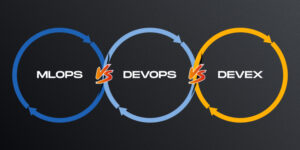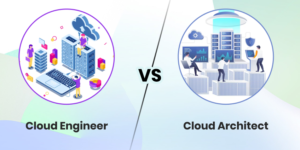
Introducing DevOps engineers — the professionals responsible for modernizing software development and operations! Today, agile organizations are looking to employ these experts to ensure their business processes remain scalable and reliable.
The roles of a DevOps engineer vary based on an organization’s needs, but overall involve building cloud-based solutions; deploying applications through a continuous integration/continuous delivery pipeline; monitoring systems performance; automating application makes & deployments tasks where possible (through scripting); ensuring security compliance; resolving operational issues quickly when they arise.
In addition, Tech expertise such as coding skills & database administration capabilities is usually required for this position. With its requirements ranging from technical acumen to strategic decision-making— it’s no wonder most employers seek out highly trained individuals with innovative problem-solving attitudes! In this blog, we go through DevOps engineers roles and responsibilities.
What is DevOps?
DevOps is an integrated process to software product development, operations, and quality assurance. It brings together teams from different departments within a business to improve collaboration as they seek new solutions for existing processes. DevOps seeks continuous integration by automating manual tasks while streamlining feedback loops and reducing downtime, making it easier for businesses to deliver reliable services quickly and efficiently.
At its core, DevOps focuses on creating better efficiency through cross-functional workflows that foster collaboration across all stages of the product or service delivery lifecycle – from conception and designing to deploying updates in production environments seamlessly without interruption.
What is a DevOps Engineer?
DevOps Engineers are professionals with expertise in software development and operations (Dev & Ops) that enable organizations to deliver better quality products rapidly. They employ various tools, techniques, and practices such as version control systems, continuous integration services, automation scripting languages like shell scripting or Python, etc., and configuration management solutions like Chef/Puppet/ Ansible for application deployment on cloud technologies.
DevOps engineers are fluent with communication methods between different organizational departments for faster results, including designing architecture and support plans for easy deployments at all stages throughout the product lifecycle.
Additionally, they help create various processes related to security testing, automated builds, and environment configurations across production cycles, ensuring delayed time-to-market, leading toward a favorable customer experience.
How to Become a DevOps Engineer?
If you are looking for a challenging, rewarding career in technology, becoming a DevOps engineer might be an ideal choice. As part of your role as a DevOps professional, you will use advanced automation tools and techniques to increase business efficiency. You’ll also help advance industry-leading technologies through collaborations with different teams within the organization.

To become qualified for this position requires at least one year of experience working with operating systems such as Linux or Windows Server Administration, plus knowledge in scripting languages like Python or Bash Scripting is essential too. For those who wish to pursue further qualifications, programming skills, including SQL databases and JavaScript, may prove advantageous when seeking promotion opportunities later on down the line.
You must have strong communication abilities since collaborating closely between various departments is critical in achieving results successfully; not just technical understanding but excellent problem-solving capabilities alongside innovative thinking methods are expected from all potential hires applying for these jobs today!
DevOps Developer Skills
1. Communication
A DevOps engineer is an invaluable asset for any organization, possessing highly sought-after skills such as communication and collaboration. They are trustworthy for bridging the void between development teams and operations groups to confirm successful project execution.
Not only do they need strong technical knowledge in scripting or coding, but they also have excellent written and verbal communication skills with a professional tone when working with clients, colleagues, team members, or external vendors.
Their ability to think outside conventions improves efficiency by implementing creative solutions that help streamline workflows while maintaining accuracy throughout different phases of the delivery process, from the concept stage to the completion phase. Being able to multitask efficiently while having the capability to adjust their workflow quickly makes them perfect potential candidates for many roles within organizations!
2. Experience with DevOps tools
DevOps Engineers must boast a wide range of skills and experience with DevOps tools, enabling them to deploy solutions for their customers rapidly. Their core competencies should include:
- Vast technical knowledge of platforms like Kubernetes, Docker Swarm, or Openshift.
- Expertise in cloud platforms such as AWS or Azure.
- Understanding of source control systems like Gitlab and Github.
- Familiarity with continuous integration/continuous delivery (CI/CD) pipelines such as Jenkins Pipeline and Ansible Tower, supplemented by the ability to handle configuration management through Chef, Puppet, or Saltstack.
They should be well-versed in scripting languages, including Bash, Python, or Ruby, which enable automation tasks within an organization’s software development life cycle processes. All these capabilities will make them indispensable assets when developing resilient digital products that can respond quickly to changes while meeting customer demands efficiently.
3. Project Management
DevOps engineers must possess many technical and management skills, but perhaps most valuable is their ability to manage projects effectively. Project managers need the know-how to plan, coordinate and organize activities related to software development for teams to achieve successful outcomes.

With detailed knowledge of how different technologies work together and an understanding of business strategy tied to customer needs, DevOps engineers must have what it takes when it comes time for project launch or delivery.
From budgeting resources and keeping track of progress milestones to managing change requests – these professionals are essential in delivering high-quality solutions that meet customers’ strategic goals efficiently.
4. Optimizing release cycles
Leveraging an experienced DevOps engineer is a great way to optimize the release cycle, improving your time-to-market and ensuring product quality. Modern tools such as continuous integration (CI) and automated testing frameworks can automate critical processes within your development pipeline while enhancing reliability.
Their expertise in virtualization technologies allows them to spin up environments for faster deployments. Harnessing these skills equips them with best practices throughout each release cycle stage–from build to delivery!
5. Coding knowledge
With the increasing complexity of IT operations, knowing coding is essential to ensure smooth functioning. Professional DevOps engineers should possess technical and programming skills such as Linux scripting languages, Python or Ruby on Rails frameworks, HTML/CSS techniques, and version control systems like Git.
A deep understanding of these technologies ensures that DevOps professionals can stream their workflows across any environment or platform accurately and quickly.
6. Infrastructure knowledge
Professional DevOps engineers should have a deep knowledge base of the infrastructure needed to perform their duties effectively. This is pertinent not only when dealing with networks, servers, and software but also when configuring system settings.
Understanding Linux distributions or variants like CentOS or OpenBSD is essential for any successful engineer working in this environment. Additionally, they should be proficient enough with scripting languages such as Python or Powershell for automation purposes which will ultimately result in an increased productivity level overall within the organization’s IT operations teams.
DevOps Engineer Responsibilities
- Conducting system administration, such as installing and configuring hardware/software systems.
- Developing automation scripts for application deployment, server provisioning, configuration management, etc.
- Managing version control systems such as GIT through integration with automated processes like Jenkins to promote code from dev -> staging->production environments.
- Configuring Docker containers for multi-tiered applications, including virtualization and orchestration technologies like Kubernetes.
- Collaborating closely with development teams to successfully implement DevOps best practices into projects across various technologies platforms (Linux / Windows).
- Designing CI/CD pipelines that build & integrate software components efficiently while meeting specific performance criteria & security standards.
- Ensuring adherence to established quality metrics during each step of the product lifecycle by following agile methodologies.
- Monitoring infrastructure health regularly using tools like Nagios or Splunk; managing scheduled jobs accordingly.
DevOps Engineer Salary
DevOps Engineers are highly-valued professionals in the tech industry and can receive some of the highest salaries. According to Glassdoor’s latest report on DevOps Engineer salary, such a professional earns anywhere from $126,900 to $160,000 per year. This wage range is likely dependent upon experience level, and the type of company one works for.

Companies with larger budgets tend to offer higher wages than smaller ones; likewise, those that demand complex projects will also pay more money due to their requirements being greater in scope. It’s an exciting field offering potential career growth via excellent compensation & benefits!
Tools Used by DevOps Engineers
- Containerization tools – Helps developers package applications in containers so they can be effortlessly repositioned between diverse environments.
- Infrastructure as code (IaC) tools – Utilizes scripting and automation to manage cloud infrastructure configurations more effectively, resulting in faster set-up times and improved reliability.
- Continuous Integration/Continuous Delivery (CI/CD pipeline) systems– Enables streamlined deployment processes for software based on developer input through automated pipelines that allow quicker delivery of changes or updates.
- Automated testing solutions – Facilitates the execution of tests, such as regression tests, at regular intervals during development throughout all stages of a project’s lifecycle to ensure quality is maintained throughout deployment cycles
- Monitoring & Logging Tools – Allows DevOps engineers to monitor system performance metrics, including memory utilization, power usage patterns, and network traffic flows, while also providing visibility into application logs associated with their environment’s behavior enabling them to respond dynamically when issues arise quickly reduce mean-time resolution rate(MTTR).
- Security Solutions – Safeguards the organization from potential cyber threats by diligently monitoring event log data, detecting any malicious activities attempting to access mission-critical resources within their networks, preventing unauthorized users from accessing these sensitive assets both internally out externally, ensuring availability, confidentiality, integrity service levels are upheld along every step way
Also Read: Roles and Responsibilities of Quality Assurance (QA) Engineer
Conclusion
DevOps engineers possess impressive skills and abilities that allow them to bridge the gap between development, operations, and customer feedback. Their roles are increasingly important as organizations seek ways to maximize agility while ensuring quality controls remain in place.
DevOps engineer responsibilities include optimizing infrastructure performance, developing automated solutions for managing deployments faster and more efficiently, and building teams capable of quickly answering customer needs with small workloads or solutions without manual intervention.
Continuously testing applications through sophisticated frameworks such as CI/CD pipelines; implementing best practices across multiple environments to ensure reliability; creating strategies leveraging agile methodology so projects can be completed rapidly at scale while still maintaining a high standard of code quality standards—allowing companies reach their digital transformation goals easier than ever before. We hope this blog on DevOps engineers roles and responsibilities is useful to the readers.






